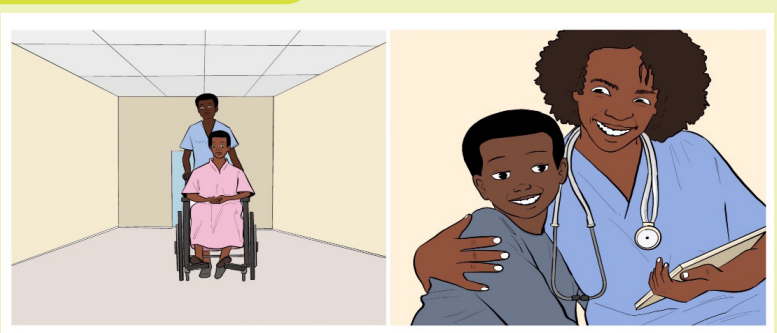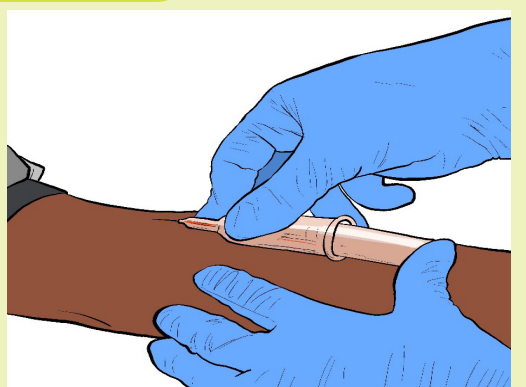UNIT 2: LEGAL PRINCIPLES IN NURSING
Key Unit Competence
Effectively use ethical principles during nursing practice
2.0 Introductory activity
Mr J. is a senior nurse working in Medical unit for more than 10 years. He is experienced in caring different clients coming in that service. A client suffering for hemiplegia (paralysis of one side of the body) was admitted for further investigations and better management. Many blood samples had to be taken, the client consented for procedures and while the nurse has inserted a catheter in the vein, the phone rings and takes it, the catheter drains the blood in bed and when he resumes the procedure, the catheter was obstructed. The client refused to be punctured again and complained to the in charge of unit about the incident. Read the above scenario and answer to the following question:
1. Has the client right to refuse a care while he is hospitalized?
2. Which legal principle is not respected by the nurse in this scenario?
2.1. Concepts of law and Legal principles
Learning activity 2.1
The client Mrs.K. 55 years old was admitted in Emergency referred by a nearest health center for better management for a long lasting disease. She has body weakness, fever and high blood pressure. She was awake but very weak to get up alone and to satisfy the need of urination. After a short assessment, the nurse Ms.S. decide to insert urinary catheter and an injection of an analgesic drug even if the client was able to use a bed pan assisted by the care giver. She continued vital signs, and implement medical order
1. Which preliminary task the nurse has omitted?
2. After two days, the client complains about the painful catheter and don’t’ understand why they have inserted it, why this complaint?
The Law is a body of rules of action or conduct prescribed by controlling authority and having binding (obligatory) legal force (Doreen, 2017)
Law are also rules made by humans who regulated social conduct in a formally prescribed and legally binding manner.
Basic nursing laws
All nurses should be familiar with nursing laws and ethics and they should understand as to how nursing legal issues can affect them. Basic nursing laws which all nurses should know are:
Signatures are Golden: when a physician or another health care provider orders that a procedure be done on a patient, it is the nurse’s responsibility to obtain the patient’s informed consent and signature. If the nurse does not obtain his/ her signature, both the nurse and the health care provider can be held liable for damages.
Legislation is all the laws and statutes put into place by elected officials in a state or a country.
Legal principle: are principles that guide nurses in their profession which are linked to the code of professional conduct. They are rules human behaviour that used to be considered as just, before the law started being written.
The importance of principles in Nursing practice : The principles of nursing practice describe what everyone, from nursing staff to patients, can expect from nursing profession. The principles describe what constitutes a safe and effective nursing care, and cover the aspects of behaviour, attitude and approach that strengthen a good nursing care (Royal college of Nursing, 2012). Understand what patients, colleagues, families and caretakers can expect from nurses, reflects on the practice and personal development as a professional. The principles help to generate discussions with colleagues on the aspects of nurse behaviour, attitude an approach that underpins good nursing care. Patients and their families can use the principles to evaluate the care they have received and provide their own appreciation.
Self-assessment 2.1
Show the importance of principles in nursing practice
2.2. Beneficence, Non-maleficence and Empathy
Learning activity 2.2

The client Ms. D. 38years old was admitted in Emergency referred by a nearest health center. She has body weakness, fever and high blood pressure. She was awake but unable to get up alone and to satisfy the need of elimination. The nurse Mrs.S. after assessment gives her a drug to reduce fever but give higher dose than required.
Analyze this scenario and outline the good and bad acts of the nurse Mrs.S.
a. Beneficence is doing or active promotion of good. This is done by providing health benefits to the clients, balancing the benefits and risks of harm, considering how a client can be best helped.
b. Non-maleficence is avoiding harm as a consequence of good. The nurse must weigh the harm against the expected benefit and avoiding deliberate risk of harm that occurs during the performance of nursing actions. Determining if using technological advances provides benefits that outweighs risks.
c. Empathy: It’s the ability to understand and share another person’s thoughts and feelings in a situation from their point of view, rather than your own. It differs from sympathy, where one is moved by the thoughts and feelings of another but maintains an emotional distance.
In nursing practice, there is need of compassionate empathy, with this kind of empathy the nurses not only understand a person’s difficulty and feel with them, but he/she spontaneously moved to help, if needed.”
Self-assessment 2.2
1. Explain the meaning of empathy
2. Using example, explain how you can promote empathy and beneficence in caring clients.
2.3. Self-determination, Justice and Veracity
Learning activity 2.3
Ms.M. a 20 years old female patient, has a hip fracture after a road accident. She was admitted in surgical ward for better management of the fracture. She will probably stay there for a long time as the fracture is diagnosed complicated
The nurse Mr.T. is working in that unit and spends a lot of time near that girl while other clients claim that they don’t receive drugs on time.
What do you think about the nurse professional behaviour?
a. Self-determination: ways by which each nurse professional controls and guides his /her own life, this includes the own life in link with the practice of the profession
b. Justice (fairness, equitability): Justice refers to fairness. Most often used in discussions about access to health care resources, including the just distribution of resources. Justice is the promotion of equity or fairness in every situation a nurse encounters.
The following nursing implications promote justice:
• Care must be fairly, justly, and equitably distributed among a group of patients.
• Ensuring fair allocation of resources. (example: appropriate staffing or mix of
• staff to all clients)
• Determining the order in which clients should be treated. (example: setting priority)
c. Veracity means telling the truth. It is essential to the integrity of the client-provider relationship, to be honest with clients and the client must receive accurate, unbiased, and understandable information.
Self-assessment 2.3
1. What it is the meaning of self- determination for a professional nurse?
2. Using an example, illustrate how a nurse can apply the principle of justice in patient care
3. Give an example of the truth to tell to the client
2.4. Accountability, Autonomy, Fidelity
Learning activity 2.4

The client M. W. 60 years old was admitted in surgical word with surgical wound and has medicine to receive Ceftriaxone 1g BID. The nurse Mr. J. after initial assessment for admission discovered a typing error that the drug is given TID instead of BID. He called the Doctor and asked to change the frequency of medicine which is BID and the Doctor agreed.
Which principles Mr J. is using?
a. Accountability: Nurses have professional responsibility to ensure and they must be competent to practice. They have an obligation or willingness to accept responsibility or to account for one’s actions, it is taking assigned responsibility for something that you have done or something you are supposed to do.
b. Fidelity is the duty to be faithful to one’s commitments including to keep promises, faithful devotion to duty. The nurse must be faithful and true to their professional promises and responsibilities by providing high quality, safe care in a competent manner
c. Autonomy is the promotion of independent choice, self-determination and freedom of action, the Independence and ability to be self-directed in health care provision. This means that patients are entitled to make decision about what will happen to their body.
Self-assessment 2.4
1. By using an example, explain how a nurse can involve the client in the nursing care, in order to respect the autonomy and promoter his/ her wellbeing
2. Explain briefly the meaning of fidelity in nursing care, does it have impact in the client recovery?
2.5. End unit assessment / Summative assessment
End unit assessment
Read the following options carefully and choose the right answer
1. While practicing nursing profession, each nurse
a. Ignore their personal values when acting in a professional role
b. Maintain professional values but be aware of personal values
c. Be aware of professional values and always act on personal values
d. Be aware of client values and ignore professional values
2. Autonomy in nursing is concerned with:
a. Respecting people’s right to be self-determining
b. Stopping people making their own decisions
c. Making sure that people make the right decisions
d. Making shared decision taken for the client
3. A nursing student documents the client’s full name and date of birth on a
flip chart for a course in a seminar and put it in the room for presentation.
Which of the following the client rights he is going to violate?
a. Right to full disclosure
b. Right to self determination
c. Right to privacy and confidentiality
d. Right to avoid harm
4. When an ethical issue arises, the nurse must assume responsibility and
behave as a professional. Among the following, which one is the most
important nursing responsibilities in managing client care situations?
a. Remain neutral and detached when making an ethical decision.
b. Ensure that a team is responsible for deciding ethical questions.
c. Follow the client and family wishes exactly
d. Be able to defend the morality of one owns’ action
Read carefully the following statement and answer by T if it is true or by F it is false
1. Fidelity is the duty to be faithful to one’s commitments including to keep promises, faithful devotion to duty
2. They nurse has obligation or willingness to accept responsibility or to account for one’s actions
3. During the exercise of nursing profession, the client has right to participate in nursing acts done on her/his body
4. Empathy: it is the ability to understand and share another person’s thoughts and feelings in a situation from its point of view rather than your own
5. The truth telling is not practical in nursing profession but reserved to medical profession
6. The respect of the client privacy while providing care is not necessary if the client is not aware about surrounding events
Short answer questions
1. Explain the following principles of nursing practice:
Justice, Confidentiality, Beneficence
2.6. Additional activities
a. Remedial activities
1. What are the legal principles respected in nursing practice?
2. Which principles are respected in the following statement
• All clients’ needs respect at the same level , without any discrimination
• Client secret should not be disclosed
• A nurse is responsible to acts done to the patient
b. Consolidation activities
3. How a nurse can promote these principles in healthcare?
• Justice
• Autonomy
4. As a student in the program of associate nurse, suppose you are going to be a proud and competent nurse associate, after learning the conduct of a nurse towards the client and colleagues, your colleague has posted information given by the client, another he promises to the client to help him to get a wheelchair but the client has not received the feedback and he has provided information to the client using medical terms and the client did not understand the meaning
Explain 3 moral principles that the nurse have not respected
c. Extended activities
5. Using examples clarify implications of a nurse to apply the principle of justice in healthcare?
